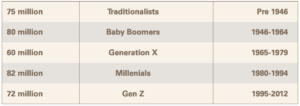
Understanding GenZ: Know Their Personality
How can you be more effective about reaching and leading the generation after the Millennials?
Born between 1995 and 2012, at 72.8 million strong, Gen Zers are making their presence known. It is the generation that is now collectively under the age of 25. They’re radically different from the Millennials, yet no one seems to have been talking much about them until recently.
While there has been a great deal of conversation about “fixing” the Millennial generation, we are in danger of missing the next generation as they step into the workplace – and leadership roles at our churches.
As a group, on one hand they have been notorious about dropping out from your church. On they other hand, they make up a significant part of both your ministry participants and prospects.
They are also beginning to step into very visible leadership roles in your church.
So what does Gen Z look like, and what does that mean for your church?
THE QUICK SUMMARY – David Stillman and Jonah Stillman, Gen Z @ Work
A generations expert and author of When Generations Collide and The M-Factor teams up with his 17-year-old son to introduce the next influential demographic group to join the workforce—Generation Z—in this essential study, the first on the subject.
Based on the first national studies of Gen Z’s workplace attitudes; interviews with hundreds of CEOs, celebrities, and thought leaders on generational issues; cutting-edge case studies; and insights from Gen Zers themselves, Gen Z @ Work offers the knowledge today’s leaders need to get ahead of the next gaps in the workplace and how best to recruit, retain, motivate, and manage Gen Zers. Ahead of the curve, Gen Z @ Work is the first comprehensive, serious look at what the next generation of workers looks like, and what that means for the rest of us.
A SIMPLE SOLUTION
In order to begin to understand Gen Z, you first need to put them into perspective with the rest of the population at large:

Then, there is the conundrum of what to call them. Words matter, and once attached, are hard to change. Each of the generations prior to Gen Z were named, and for various reasons, Gen Z seems to be the one most favored.
But don’t be mistaken – Gen Z is not a “label” to be applied to the millions of individuals born between 1995 and 2012, all with very unique differences. It’s a name – but it represents some very interesting characteristics.
A new generation is starting to hit our workforce, yet no one seems to be talking about it. Until now.
In order to pioneer a dialogue about what they will be like in the workplace, here are seven key traits of Gen Z
Phigital: Gen Z is the first generation born into a world where every physical aspect (people and places) has a digital equivalent.
Hyper-Custom: Gen Z has always worked hard at identifying and customizing their own brand for the world to know. Their ability to customize everything has created an expectation that there is an intimate understanding of their behaviors and desires.
Realistic: Growing up during the aftermath of 9/11, with terrorism part of everyday life, as well as living through a severe recession early on, has created a very pragmatic mindset when it comes to planning and preparing for the future.
FOMO: Gen Z suffers from an intense fear of missing out on anything. The good news is that they will stay on top of all trends and competition. The bad news is that Gen Z will always worry that they aren’t moving ahead fast enough and in the right direction.
Weconomists: From Uber to Airbnb, Gen Z has only known a world with a shared economy. Gen Z will push the workplace to break down internal and external silos to leverage the collective in new convenient and cost-effective ways.
DIY: Gen Z is the do-it-yourself generation. Having grown up on YouTube, which can teach them how to do just about anything, Gen Z believes that they can do just about anything themselves.
Driven: With parents who drilled into them that participation is not a real reward and that there are winners and losers, a recession that pulled the rug out from their predecessors, and a rate of change that is hard to keep up with, it is no wonder that Gen Z is one driven generation.
David Stillman and Jonah Stillman, Gen Z @ Work
A NEXT STEP
If you want to know more about Gen Z in your church, start at the source. Even with the wide range of ages, it would be informative to sit down with a group of Gen Zers and have a dialogue with them:
- What do they like to do with free time?
- Who is their favorite celebrity?
- What kind of music and entertainment do they regularly listen to?
- What brands do they like the best?
- What apps do they use most on their phones?
- What colleges do they want to go to, if at all?
- What is most important to them right now?
Another goldmine of information on Gen Zers? Teachers! Take a few teachers out to lunch and ask them:
- What do they see happening with this generation, as they become young adults and leaders in the world?
- What were their biggest struggles in working with Gen Z?
- What gaps do they see in current societal needs that Gen Zers may struggle with?
- For those teachers who have been around awhile, what were the biggest differences between Gen Z and Millennials (born 1980-1994)?
Finally, take a look at the list of seven traits above. Which is most important to you in terms of ministry with Gen Z? Share that with your team and encourage them to be on the lookout for Gen Zers who have this trait, and how it can be used in your churches ministry.
On the flip side, take a look at the list again, looking for the least important trait. Recognizing that it may be important to others, dialogue with your team how this trait can be strengthened with the Gen Zers you minister with.
Excerpt taken from SUMS Remix #70-1, released July 2017.
This is part of a weekly series posting content from one of the most innovative content sources in the church world: SUMS Remix Book Summaries for church leaders.
SUMS Remix takes a practical problem in the church and looks at it with three solutions; each solution is taken from a different book. Additionally, a practical action step is included with each solution.
As a church leader you get to scan relevant books based on practical tools and solutions to real ministry problems, not just by the cover of the book. Each post will have the edition number which shows the year and what number it is in the overall sequence. (SUMS Remix provides 26 issues per year, delivered every other week to your inbox).
>> Subscribe to SUMS Remix <<

Tags: Gen Z at Work, Generational Cohorts, Generational differences, Generations












